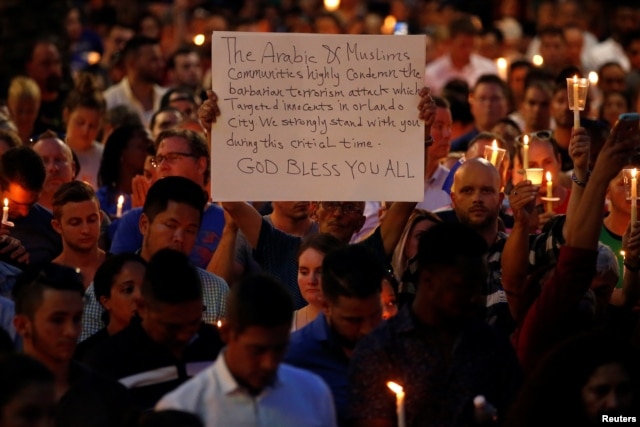After Sunday’s tragedy of the shooting in Orlando (and the one that almost occurred in California) I’ve watched a wide range of reactions unfold.
Of course those directly affected showed their overwhelming grief.
Many showed sympathy and empathy through memorials, act of kindness, promises of prayer, donation of blood.
Others expressed anger at multiple parties.
Some used the event as a way to blast others: Muslims, leaders, lawmakers, presidential candidates, guns supporters/opponents, you name it.
And many whose belief systems conflicted with those of the people killed in a gay bar stayed quiet.
Internally, I found myself with mixed feelings about each of these groups. I am deeply saddened by the loss, the hatred, the grief. I am encouraged by those who chose to do everything possible to show love, especially in a practical manner. I am angered by the way some warped the tragedy to fit their agendas.
As a Christian, I believe we as the Body of Christ have a very clear command to follow in this and all painful circumstances: LOVE.
Too cliché? Perhaps. But the challenging part is not showing selective love where it feels best.
Loving the LGBT Community
Many of my friends have made beautiful comments on Facebook, reaching out to those in grief and condemning the horrific act done. Christian businesses such as Chick-fil-A went out of their way to give practical help. Christian leaders and writers issue the call to pray, grieve, and show love.
But to some in the LGBT community, the response doesn’t seem to be in line with negative, often hateful, messages they have been receiving repeatedly from the church. It would be easy to question to authenticity of kind words from the same mouths carrying disdain.
Did something change overnight? Is the expression of kindness out of a sense of obligation (nobody wants to look cold hearted), or is this opening eyes to see deep wounds in real people?
I don’t expect people to change their opinions on issues like gay marriage. But the display of love should never be isolated to a horrific event. These real, hurting people have already struggling with the same issues everyone else is, often compounded by feelings of rejection and belittling. Judging others is not our calling. Loving is… not just after a shooting.
Can this be a wake-up call? Are we willing to reach out, to build bridges and relationships, hoping that members of the LGBT community are gracious enough to give us a chance?
Loving the Muslim Community
Recently I was with two Muslims as they broke the daily Ramadan fast. We shared food and conversation about God, fate, and suffering. We wrestled with how unfair life can be, yet the amazing ways God can bring us out of challenging times, whether war in the Middle East, ongoing health problems, or unexpected disasters. Their words were far closer to the truth of Scripture than they were to the violence of ISIS.
They are not the only kind-hearted, hospitable Muslims in the US. They represent the vast majority. So when I hear blanket statements made about Muslims because of the actions of one American man who aligned himself with whatever hateful radical Islamist group he could, I am grieved. Blocking refugees fleeing from war-torn countries because of their faith will not stop the actions of an abusive, aggressive US citizen, even if that man calls himself Muslim.
[Meanwhile in California, the police stopped a man headed toward a gay pride event with assault rifles and explosive chemicals. Anyone notice that no statements were made about whatever faith or ethnic community this man represented? All I know is that he looks white and is from Indiana.]

Muslims across the country have condemned the atrocity that occurred. Many reached out in practical ways, donating blood despite the daytime fast of food and water. Others gathered to pray for the victims and their families. They respond to the incredible pain and loss being experienced in Orland and across the nation.
Yet, how often do we do that for them? Many of those who have escaped war-torn countries still have family members and friends left behind. They hear of their entire villages being destroyed. Hundreds of thousands of their countrymen have been killed. Millions of fellow Muslims have been displaced, many dying in their attempts to seek refuge. Has your church or community ever have a vigil for them?
This month, during the observance of Ramadan, many Muslims are actively seeking God, seeking truth. Now is the time to reach out to them, pray for them, talk to them, ask to hear their stories, tell yours, build friendships.
Loving Politicians (on all sides)???
Okay, I have to admit this might be the hardest one for me right now. I find myself constantly frustrated with the leading candidates of both parties. Fundamental rights of life and liberty seem to be threatened in different ways by either side, whether the unborn child or the fleeing refugee. I’m saddened by the constant patterns of attack and hate, the use of fear, the warped truth. I don’t like the way “allegiances” to parties or leaders are leading to more conflict and harsh words within the church. So how do I show love?
There may be space for “speaking the truth in love” for some issues that I see as critical. I strongly disagree with some of the statements and actions I see, and won’t accept or ignore them. But I am making an effort to not get sucked into chain of attacks, and would challenge others to do the same. We can still love those in another party; we can still have discussions without belittling each other. We can still pray for our present and future leaders, especially when addressing significant issues like crime, gay rights, immigration, refugees, guns, mental health, domestic violence, and the list goes on and on.
This is the time to step up to the plate and show love to everyone, regardless of differences in background or beliefs. Jesus told His disciples that they would be recognized by their love. Is that how we are recognized today?





Thank you, Emily! I appreciate your words. Somehow along the way our culture has lost the ability to discuss differing thoughts and ideas without demonizing and excluding. May God help us truly understand what ‘speaking the truth in love’ is all about! May we walk alongside each other in joy and sorrow in gracious, considerate ways while at the same time upholding our convictions and beliefs. May we truly be more like Jesus – that wonderful God/Man who understood turbulent times.
So true, Renee! Jesus gave the perfect example when crossing all cultural/social barriers–He spent time with Samaritans, tax collectors, women, even Pharisees and Sadducees with their rhetoric and arguments. His message of love remained steadfast.
So good and insightful on so many levels…thank you, Emily. Will be sharing this.
I’m going to say something about what you said (but only the text up to the second picture). Because I feel some of what you said is likely to be misinterpreted by one side or the other. I’m giving my opinion, not speaking for you (though I hope that what I actually say you’d agree with, whether you like my wording of it or not. I’m just trying to be clear here that this is MY opinion, not necessarily yours.]
God says homosexuality is an abomination. Therefore it is. But some people’s biases (or fear of those around them, or their own sinful nature) cause them to say “That’s hate speech.”
Only to people with hate in their own heart. So if you have hate in your own heart and say it, then it was probably said hatefully. If you have hate in your heart when hearing that statement, then it is heard hatefully.
[Since God also said that every righteous thing we can do is filthy rags in His sight, and He IS love, we humans all have hate in our heart – probably more than we realize.]
But ignoring those more technical theological facts, a person can make the above statement about homosexuality neither feeling nor intending any hate. So honestly saying homosexuality is a sin and then helping a gay who is hurting is not hypocrisy in that situation – it is Christian love in both cases (though some surely did so out of guilt, etc).
A woman at church said to me that if one of my children came out as gay I’d change my mind. Not true! I would love my child as much as ever, but I’m not blind to their faults. So how would this sin be any different?Acknowledging that you or I or my child did something wrong does not change our love. If it appears to, it wasn’t love.
You said that an LGBTQ [isn’t that usage objectifying people?] would think someone who spoke in disdain [a bias there] about their lifestyle and then helping them was valid cause to question the authenticity.
A thousand times NO! Saying that theft is a sin SHOULD mean to the Christian a need to pray for that person. People use Matthew 18 as a way to excommunicate. Anybody saying that doesn’t understand what Jesus said. He said if someone in the church sins, speak to them privately. If they don’t repent, speak to them with a couple church elders. If they still don’t repent, bring them before the church. If they still don’t, treat them as an unsaved person. How is the church supposed to treat unsaved people? By trying to help them become saved. Too many Christians view that passage as dis-owning a relative (in Christ), when instead it is realizing that the things of the Holy Spirit can only be understood with His help – so it’s time to evangelize that person. [In practical terms, the best way to do that at that point might be to pray for them and encourage another group to work with the person – maybe that group’s style will work better than your own style. [Denominations are a good thing if you work together, a bad thing if you don’t.]
So, preaching that theft is wrong is not hate speech. Preaching that adultery is sin is not hate speech. Preaching that homosexual activities is abomination to God (and therefore to us) is not hate speech. Saying any of those things while hating that person — now that is hate speech. Anyone that says otherwise is doing just like Satan in the garden – trying to convince people that God didn’t really mean what he said. Saying something is sin is not hate speech – that’s caring enough about the person that you don’t want them hurt by sin. Now that is true love.
Jesus (The Word of God) consistently called the Pharisees and Sadducees names, constantly spoke harshly to them, pointing out their sin – because He doesn’t want any to perish – in other words – in love. It’s why all the sermons we see from the Apostles so consistently point out the hearers’ sins – because they want so desperately for them to be saved – and it’s why so many did get saved. [ It’s ironic that seminaries today condemn the style of preaching visible in the NT.]
Aren’t you thankful that Peter and the other apostles didn’t respond to the pharisees with “You don’t want us to speak about Jesus? Yes, sir, we’ll listen to you rather than God”?
Thanks for letting me put in my two cents.